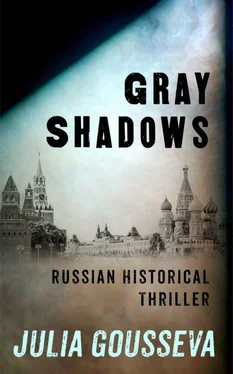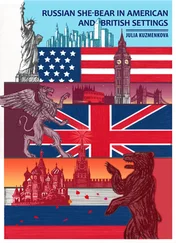Julia Gousseva
GRAY SHADOWS
Nikolai slipped his Makarov pistol into the shoulder holster, put on his jacket, and stepped outside. He checked the time: a quarter to ten. As agreed, his client’s black Audi was parked on the corner. Everything was exactly like it was supposed to be. So far, the only unusual thing that winter morning was the bright sun that enveloped Moscow with a surreal warm glow.
He squinted and crossed the street, looking for things out of place, for anything different, anything that suggested a possibility of danger. He passed by a small playground where two young mothers were pushing their toddlers on the swings. An elderly couple, hand in hand, walked by him. A middle-aged man turned the corner and kept going, his black poodle on a long leash. So far, nothing looked alarming.
At twenty-eight years old, tall, fit, muscular, and with prior military experience, Nikolai was one of the most sought-after bodyguards in the prestigious Centurion Personal Protection Agency in Moscow. Nikolai credited his success to his attention to detail and his ability to maintain his cool even in the most extreme circumstances, and his job provided plenty of such circumstances.
Nikolai’s younger and less experienced colleagues joked that he was as meticulous and as thorough as someone suffering from paranoia. Nikolai took such comments as a compliment because his so-called paranoia had saved more than one client’s life, and Nikolai’s own life, on more than a few occasions.
As he neared the familiar four-story building, Nikolai closed his left eye in preparation for the darkness inside, a trick that cut the eyesight adjustment time in half. He opened the heavy spring-loaded door, stepped inside and started walking up the steps to the top floor, looking for anything that could be a threat. Business as usual.
His goal was to detect any changes from the day before, check for anything potentially lethal, and eliminate it. On the landing between the second and third floor, a piece of cardboard was stuck behind a radiator. That was a change, so Nikolai carefully pulled it out, inspected it, and swept the ray of his flashlight all around the radiator: nothing. On the third floor, an old kitchen sink was leaning against the wall. Another change. Probably, someone was remodeling, but Nikolai had to be sure. He lifted the sink, scaring a white cat that meowed angrily and ran up the steps. Nothing behind the sink. So far so good.
Nikolai kept walking up, all the way to the top. He inspected the floor by the door to the attic: it was clean and shiny, which meant that nobody had been inside the attic. The day before, Nikolai had sprinkled a thin line of powdered chalk right by the door. The line was barely visible, but if somebody had opened the door and walked around, Nikolai’s flashlight would have revealed white chalky traces. There was nothing.
Nikolai took one last look around, ran down to the second floor, and rang the doorbell. Vasily Petrovich, his client of the last three months, opened the door and motioned for Nikolai to come in. Vasily Petrovich was a tall, broad-shouldered man in his late thirties, but looked closer to mid-forties. His face was youthful, but his manner and formal suits suggested someone more mature, a man who grew up too fast, like many of his generation and social status.
Nikolai liked and respected Vasily Petrovich: he was smart, rational, and level-headed. He was also an honest and genuinely good person, and that made working for him so much easier. Money was not enough for Nikolai to continually put his life at risk; he had to have respect for his client and believe that saving that client’s life was a worthy endeavor. Nikolai often wondered how Vasily Petrovich managed to work as a lawyer for the government and resist corruption. His honesty was part of the reason for Nikolai’s presence.
Vasily Petrovich called the Centurion Agency after a wave of high-profile murders of judges, prosecutors, and prominent businessmen swept through Moscow. Even though no direct threats were made against Vasily Petrovich, contentious disagreements were frequent and unpredictable at the current period of transition from government-owned to privately owned property. And many such disagreements got settled in the streets, with guns and car bombs. Vasily Petrovich needed a bodyguard to help him avoid falling victim to one such disagreement.
Today, Nikolai was to accompany Vasily Petrovich to a meeting between the Russian government and potential investors.
Vasily Petrovich buttoned his coat and picked up his briefcase.
“Ready to go?” Nikolai said.
“Ready if you are.”
The tension in Vasily Petrovich’s voice was palpable. Nikolai had witnessed enough of such meetings to know how heated and unpredictable they could get. The constantly changing investment, tax, and business laws made coming to practical agreements difficult, and the prospect of enormous monetary gains or losses trumped existing laws, pushing the participants to find other ways to settle disputes after the meeting, often outside of the legal realm. Nikolai’s job started right where the civilized disputes ended.
Vasily Petrovich lit a cigarette, and they walked downstairs. As usual, they did not talk much. Nikolai needed to stay focused on the surrounding circumstances. He also did not want to get too emotionally close to Vasily Petrovich. Getting too friendly with clients could lead to loss of vigilance, potentially fatal for both. Danger was especially likely when it was least expected.
When they reached the first floor, Nikolai opened the front door and stepped outside first, his Makarov at the ready. He looked up and down the street. Nothing. He motioned for Vasily Petrovich to come out.
As soon as the two of them were out on the street, an old truck, its bed covered with thick black tarp, careened around the corner and hit the brakes, coming to a screeching halt.
“Get back inside!” Nikolai shouted even before he saw the long gun barrel appear from under the tarp. Multiple shots were fired, and Nikolai shot back, aiming alternately at the tarp and at the wheels. He pushed Vasily Petrovich down on the ground, back towards the building entrance. Immediately, Nikolai felt a sharp searing pain in his left leg and saw blood on Vasily Petrovich’s coat. Ignoring the pain, Nikolai kept shooting as he struggled to get them both back inside the building.
The thud of the heavy door slamming shut shielded them from the thundering gunfire. And almost at the same time, Nikolai heard the whine of a revved-up truck engine, followed by the screeching of tires. Nikolai reached for his phone to call the ambulance. All sounds faded and everything went dark.
The next sound Nikolai heard were voices he couldn’t recognize, low mechanical humming, and faint sounds of footsteps. He listened for a little longer before opening his eyes, trying to get oriented. When he opened his eyes, he saw exactly what he had expected: he was in a hospital bed, with medical machines, monitors, and tubes connected to him.
“Nikolai! You’re awake!” he heard Olga’s voice from the corner. A second later, she was next to him, taking his hand in hers.
Olga sat down on the chair next to his bed. She smiled. It was a bittersweet smile, with relief, love and worry mixed together. Her dark hair was pulled back in a ponytail. She looked a little tired and even thinner than usual. She tended to lose weight when she was stressed, and that was a lot lately, largely because of Nikolai’s job.
“I was so worried about you!” Olga said. “How are you feeling?”
“Alive,” Nikolai said.
“Do you need anything?” Olga said. “Besides all that.” She pointed to the bedside table.
Читать дальше












